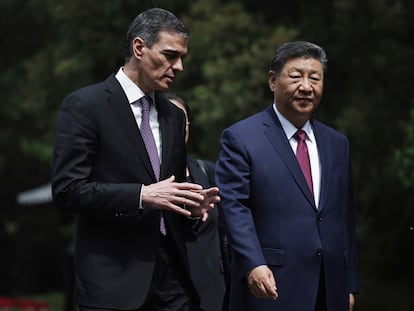China hits back at the US and raises tariffs to 125%
‘There are no winners in a tariff war,’ argues President Xi Jinping in his first remarks following the escalation of the trade war


China has delivered a new blow in response to the tariff wall erected by U.S. President Donald Trump against Chinese imports.
On Thursday, Washington announced that the tariffs imposed on China had risen to 145% — that is, the 125% announced earlier in the week, plus an additional 20% because of China’s alleged export of fentanyl precursors.
On Friday, Beijing retaliated with another increase in import taxes, raising levies from 84% to 125%, mirroring the action taken by the U.S. administration. The new rates will take effect on Saturday. Meanwhile, the 84% tariffs remain in place, which China activated on Thursday.
“The U.S.’s imposition of abnormally high tariffs on China seriously violates international trade rules, basic economic laws and common sense, and is completely a unilateral bullying and coercion,” said China’s Tariff Commission of the State Council (the Chinese government) in a press release, as reported by Chinese state media.
China also announced it will file another complaint with the World Trade Organization’s dispute resolution mechanism — a move it has made in response to each new wave of U.S. tariffs.
This Chinese countermeasure, which significantly escalates the trade dispute between the two economic superpowers, comes on the same day Chinese President Xi Jinping met with Spanish Prime Minister Pedro Sánchez in Beijing. During the meeting, Xi addressed the trade war with the U.S. for the first time, without directly naming the United States.
“There are no winners in the tariff war and standing against the world ultimately results in self-isolation,” said Xi.

No contact
Meanwhile, no high-level contact has occurred between China and the U.S. to address the growing rift in their relations. On Thursday, Mao Ning, China’s Foreign Ministry spokesperson, stoked tensions by sharing on social media a speech from former president Mao Zedong during the Korean War, a conflict in the early 1950s that pitted China and the U.S. against each other.
In the speech, Mao Zedong asserts that it is up to the U.S. president to end the war: “No matter how long this war is going to last; we will never yield.” On Friday, the spokesperson again posted another old message from Mao, calling the U.S. a “paper tiger” and warning not to believe its “bluff.”
Yet no contact has been made, and neither side appears willing to be the first to pick up the phone. “The world needs both China and the U.S. to talk,” emphasized Sánchez in Beijing during a press briefing after his meeting with Xi.
China also remarked that the back-and-forth tariff increases have become a meaningless “numbers game.” “If the U.S. continues to play the tariff numbers game, China will ignore it. However, if the US insists on continuing to substantially infringe on China’s interests, China will resolutely counterattack and fight to the end,” said a spokesperson for the Finance Ministry.
Currently, China is the only country with which the U.S. has engaged in a large-scale tariff battle, after Trump declared a 90-day pause on tariffs on the rest of the world on Wednesday. Beijing has reacted to every U.S. move with a range of countermeasures across multiple sectors. In addition to raising tariffs progressively, China has restricted the export of critical minerals and rare earth elements, which are key in the technological race and a top priority for Trump, who has expressed interest in securing them from Ukraine and Greenland.
China has also imposed restrictions on several U.S. companies due to concerns over the potential dual-use — civilian and military — of their products, and added more names to its list of “unreliable entities.” Furthermore, China has announced it will reduce the number of Hollywood films imported and has issued a “precautionary” warning for Chinese tourists traveling to the U.S. “due to the deterioration of Sino-U.S. economic and trade relations.”
“Our countermeasures against US bullying are not only about safeguarding China’s legitimate rights and interests, but also about defending international rules and order, safeguarding the common interests of all countries as well as global fairness and justice,” insisted Lin Jian, another spokesperson for China’s Foreign Ministry, echoing statements from previous days. He also reiterated that if the U.S. genuinely wants to negotiate with China, it must stop “extreme pressure” and “acting recklessly.” “Any dialogue must be based on equality, mutual respect, and reciprocity,” he concluded.
Chinese state media continues to strongly defend against what it views as an unjustified attack by the U.S. “In contrast to the US government’s erratic ‘random punches,’ which change almost daily, China has consistently maintained a calm, composed, and measured response, showing the world a China that can withstand pressure, remain steady, and shoulder great responsibility,” stated Global Times on Friday, a newspaper controlled by People’s Daily, the official propaganda outlet of the Communist Party.
Sign up for our weekly newsletter to get more English-language news coverage from EL PAÍS USA Edition
Tu suscripción se está usando en otro dispositivo
¿Quieres añadir otro usuario a tu suscripción?
Si continúas leyendo en este dispositivo, no se podrá leer en el otro.
FlechaTu suscripción se está usando en otro dispositivo y solo puedes acceder a EL PAÍS desde un dispositivo a la vez.
Si quieres compartir tu cuenta, cambia tu suscripción a la modalidad Premium, así podrás añadir otro usuario. Cada uno accederá con su propia cuenta de email, lo que os permitirá personalizar vuestra experiencia en EL PAÍS.
¿Tienes una suscripción de empresa? Accede aquí para contratar más cuentas.
En el caso de no saber quién está usando tu cuenta, te recomendamos cambiar tu contraseña aquí.
Si decides continuar compartiendo tu cuenta, este mensaje se mostrará en tu dispositivo y en el de la otra persona que está usando tu cuenta de forma indefinida, afectando a tu experiencia de lectura. Puedes consultar aquí los términos y condiciones de la suscripción digital.








































